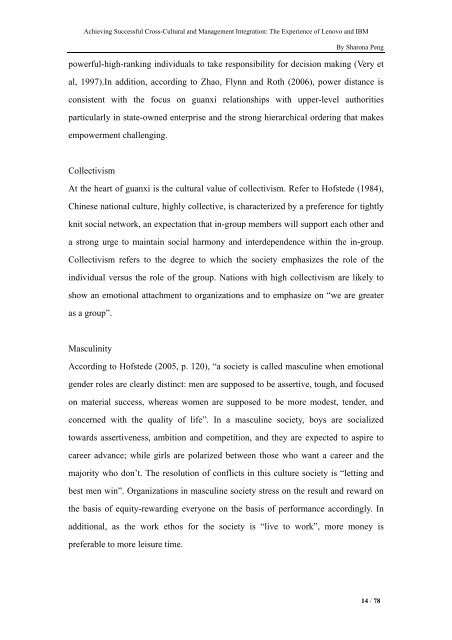Achieving Successful Cross-Cultural and Management Integration ...
Achieving Successful Cross-Cultural and Management Integration ...
Achieving Successful Cross-Cultural and Management Integration ...
You also want an ePaper? Increase the reach of your titles
YUMPU automatically turns print PDFs into web optimized ePapers that Google loves.
<strong>Achieving</strong> <strong>Successful</strong> <strong>Cross</strong>-<strong>Cultural</strong> <strong>and</strong> <strong>Management</strong> <strong>Integration</strong>: The Experience of Lenovo <strong>and</strong> IBM<br />
By Sharona Peng<br />
powerful-high-ranking individuals to take responsibility for decision making (Very et<br />
al, 1997).In addition, according to Zhao, Flynn <strong>and</strong> Roth (2006), power distance is<br />
consistent with the focus on guanxi relationships with upper-level authorities<br />
particularly in state-owned enterprise <strong>and</strong> the strong hierarchical ordering that makes<br />
empowerment challenging.<br />
Collectivism<br />
At the heart of guanxi is the cultural value of collectivism. Refer to Hofstede (1984),<br />
Chinese national culture, highly collective, is characterized by a preference for tightly<br />
knit social network, an expectation that in-group members will support each other <strong>and</strong><br />
a strong urge to maintain social harmony <strong>and</strong> interdependence within the in-group.<br />
Collectivism refers to the degree to which the society emphasizes the role of the<br />
individual versus the role of the group. Nations with high collectivism are likely to<br />
show an emotional attachment to organizations <strong>and</strong> to emphasize on “we are greater<br />
as a group”.<br />
Masculinity<br />
According to Hofstede (2005, p. 120), “a society is called masculine when emotional<br />
gender roles are clearly distinct: men are supposed to be assertive, tough, <strong>and</strong> focused<br />
on material success, whereas women are supposed to be more modest, tender, <strong>and</strong><br />
concerned with the quality of life”. In a masculine society, boys are socialized<br />
towards assertiveness, ambition <strong>and</strong> competition, <strong>and</strong> they are expected to aspire to<br />
career advance; while girls are polarized between those who want a career <strong>and</strong> the<br />
majority who don’t. The resolution of conflicts in this culture society is “letting <strong>and</strong><br />
best men win”. Organizations in masculine society stress on the result <strong>and</strong> reward on<br />
the basis of equity-rewarding everyone on the basis of performance accordingly. In<br />
additional, as the work ethos for the society is “live to work”, more money is<br />
preferable to more leisure time.<br />
14 / 78

















